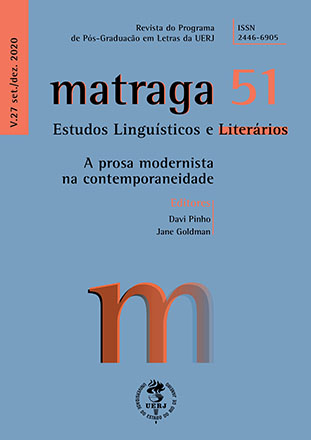“It is lonely being a young man sent abroad to fight” she said.
DOI:
https://doi.org/10.12957/matraga.2020.53816Keywords:
Short story.Abstract
[Short story]
Introduction: Readers of Kirsty Gunn’s fiction, whether the novels or short stories, are well accustomed to encountering overt and playful acknowledgement of the horizon or scene of writing in the story, to feeling like a co-creator or accomplice in the making of the story. The reader is let in on the story. And this new story, “It is lonely being a young man sent abroad to fight” she said, which begins with a dream reported to the narrator by her sister, very soon primes the reader: “Everything that happens must be followed by a conversation – it’s always event plus discussion, event plus discussion – even if the ‘everything’ is just some rag bag of images hauled up from her unconscious and set before her while she is asleep”. This story, rather like a dream, compresses so much into its swerving narrative. Fasten your seatbelts as “event plus discussion” becomes event as discussion; language is both event itself and event-making, and vice versa. Language produces events, this story makes clear, sometimes death-dealing events, perhaps the fate of that “young man sent abroad to fight” reported in the sentence that folds in and back on the story from its final line to its title. Gunn takes the epithet of “contemporary modernist” as a compliment, recognising that her own unique form of self-conscious, self-referential and dialogical making arises from a space cleared by great “modernist” writers, not least Virginia Woolf and Katherine Mansfield, along with Muriel Spark and later technicians of what we might term “the modernist sentence”1. Modernism for Gunn is a living mutating mode, not a historical literary era, nor is it a form of realism. In our foreword to this issue of MATRAGA, we ask what “modernist” experimental prose might look like in the 21st century. We hope that the question reverberates as the reader encounters the precision-engineered sentences, the lyrically-cut paragraphs, and the significant gaps that structure Gunn’s short story, which we are proud to publish for the first time as a final piece in this issue on “Modernist Prose in Contemporaneity”.
---
Original in English.
Downloads
Downloads
Published
How to Cite
Issue
Section
License
Authorization
Matraga – Scientific Journal of the Post-graduate Program in Arts and Humanities of UERJ is authorized to publish the article submitted here, if it is accepted for online publication. It is attested that the contribution is original, that it is not being submitted to another publisher for publication, and that this statement is the expression of truth.
The works published in Matraga's virtual space – Scientific Journal of the Post-graduate Program in Arts and Humanities of UERJ will be automatically transferred, and your copyright is reserved to Matraga. Its reproduction, in whole or in part, is conditional on the citation of the authors and the data of the publication.

Matraga uses license Creative Commons - Attribution-Non-Commercial 4.0 International.





